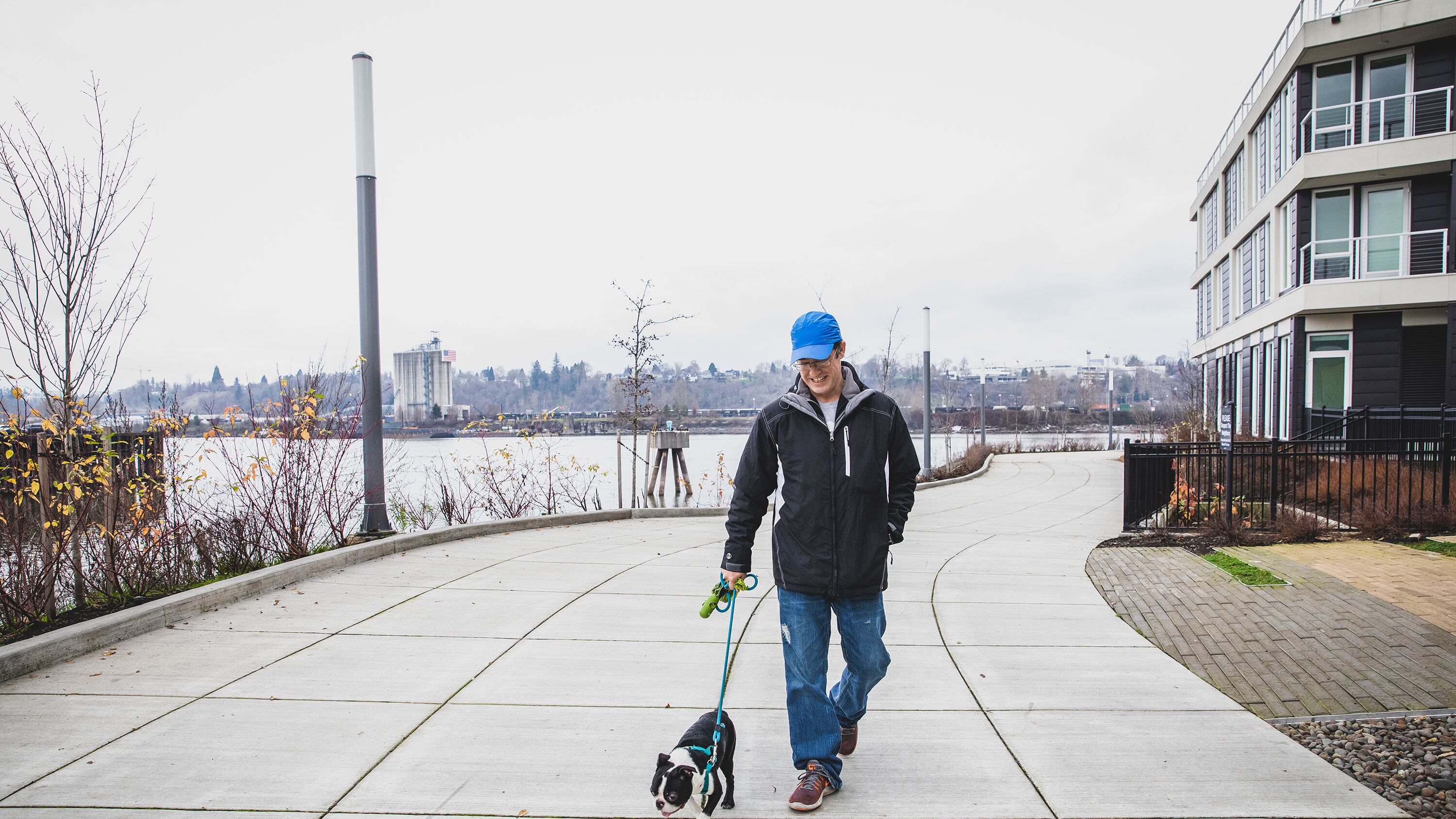Otis literally cannot contain himself.
Only a few minutes after dog-walker Josh Fielder lets the 5-month-old Boston terrier puppy out of his crate, the little guy vomits on the carpet of his owner's Southwest Waterfront apartment.
Fielder, 44, began walking dogs last June using Rover, one of two pet care smartphone applications active in the Portland area, along with Wag. It's now Fielder's primary source of income.

"Even people that I've known for 30 years say, 'You seem the happiest now at work doing this job,'" says Fielder, a military veteran, who in the past worked in law enforcement and as a car salesman. "I'm like, 'Of course I am.' You add puppies to any job, it gets better. Unless you're a fireman—I guess that would suck."
Both Wag and Rover allow you to set your own rates—Fielder charges $17 for a 30-minute walk or pet check-in and $35 for pet-sitting per night—and Rover takes a 20 percent cut. Fielder sets his own hours, but he typically works around 25 hours a week.
Fielder has owned dogs for most of his life—he's currently got two mutts named Radar and Sophie—but until he started working for Rover, he had never walked dogs professionally. On a cloudy day in January, WW shadowed three of Fielder's bookings scattered around Kenton and the waterfront. Here's what we learned.
Half the work is taking pictures.
Fielder's first booking of the day is an 11 am walk with a rat terrier named Quincy and Hamlet, a diminutive pit bull-and-chihuahua mix. After a slow stroll around the neighborhood, Fielder returns Hamlet and Quincy to their cozy Kenton bungalow, where he sends some pictures from the walk a brief message to their owners. "If [a client] specifically says to watch for, you know, 'She likes to eat poop,' or, 'She likes to bark at other dogs,' or, 'She likes to run away,' I always makes sure to mention that I took care of that," he says. "'We did not run while eating poop into traffic.'"
It's not just walking—and it's not just dogs.
Sometimes, Fielder just gets to play with a dog instead taking it for a walk. One of Fielder's regular clients is a sheltie named Henry, whom he takes to a nearby park to play fetch for the 30-minute booking. "I literally get paid to play fetch with a dog," says Fielder. "He always brings it back. It's literally the easiest thing in the world, and he's adorable." Cat owners can also book house visits at the same fee for dogs, even though it requires much less animal interaction. "If they don't hide from me under the bed, I give them a scratch behind the ear," he says.
For better or for worse, you don't really have to talk to people.
Since everything is coordinated through the app, Fielder has never met many of his clients. "I have a pocket full of keys to people's places where the only way I know who they are or what they look like is the picture on their wall," he says. Fielder passed Rover's pet care quiz and paid $30 for a more extensive, third-party background check, which seems to be enough for most people. Before a walk for a new client, Fielder offers to meet the dog while the owner is home free of charge, but the majority of people decline. "Easily, I talk to five times as many dogs as I do people in a week," he says.
You do kind of have to know what you're doing.
After Hamlet and Quincy, Fielder drives a few minutes to walk a peppy golden retriever named Quinn. Once, Quinn had a seizure while Fielder was walking her. He had witnessed one of his own dogs have a seizure, so he was able to recognize her early symptoms and promptly called her owner. But other than that, Fielder hasn't really had to navigate many emergencies, and only one hostile dog, a territorial Australian cattle dog named Cupie.
Picking up poop is the least gross part.
In Otis' apartment, Fielder can eventually get the puppy to stay still long enough to get his leash on—the trick is to turn the puppy on his back and scratch his stomach. Once he gets outside, Otis manages not to vomit anymore, but he tries to eat anything and everything he finds on the ground. Otis once swallowed a discarded joint while on a walk with his owners. "Maybe that's the downside of this job," says Fielder. "Having to reach into a dog's mouth and pull out something disgusting that you'd never want to touch in the first place."


